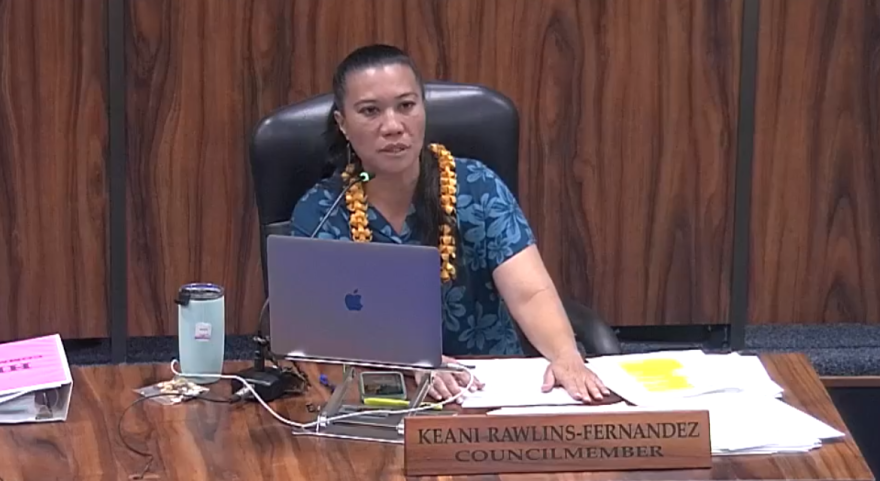A contentious bill that would phase out about half of Maui’s vacation rentals took a big step toward passage Thursday.
The Maui County Council’s Housing and Land Use Committee voted 6-3 in support of Bill 9.
The committee’s vote came after eight meetings of public hearings and deliberations. More than 300 people offered oral testimony both for and against the bill, with thousands of written testimonies also received during the process.
Bill 9, proposed by Mayor Richard Bissen last year, seeks to create more housing for local residents by transitioning short-term condo units into long-term housing. It would phase out more than 6,000 vacation rentals in apartment-zoned districts.
The committee amended the bill to include a phased timeline, beginning in 2028 with ending this sector of transient vacation rentals in West Maui — where thousands of homes were lost in the 2023 wildfires — and then in 2030 for the rest of Maui County.
After Thursday’s vote, members of Lāhainā Strong, who have championed the bill, erupted in cheers in the council chambers.
“This is a huge win for the community! This isn’t the end, this is just the beginning,” said Jordan Ruidas of Lāhainā Strong. “From occupying Kāʻanapali Beach to the halls of county and state government, we’ve fought with everything we have to bring our people home. We look forward to the work ahead in collaboration between the community, the council and the administration to make sure that Bill 9 returns the apartment zone back to its intended purpose of residential multi-family housing.”
Councilmembers weighed the consequences of passing the bill, as well as pathways for affected condo properties to seek a change in zoning to hotel district during a transition period.
Councilmembers Keani Rawlins-Fernandez, Tamara Paltin, Shane Sinenci, Gabe Johnson and Nohelani Uʻu-Hodgins voted “aye”; Council Chair Alice Lee voted “aye” with reservations; and Committee Chair Tasha Kama, Yuki Lei Sugimura and Tom Cook voted “no.”
Cook, in his “no” vote, expressed concern for jobs he said would be lost in the tourism industry, and what he called a lack of “actionable” procedures to enable properties wanting to seek rezoning to do so more easily.
Sugimura, in casting her vote against the measure, encouraged affected property owners to contact her office for help with the rezoning process.
Lee voted “aye” with reservations, but labeled the bill “half-baked,” calling it “hastily put together by a lot of inexperienced people.”

Rawlins-Fernandez said she’s proud of the bill and the work that’s gone into it, acknowledging the challenging process.
“Because of how difficult this has been, we know that that’s why mayors and councils before, never made this correction, to ensure that our residents live in apartment-zoned district,” she said. “This has been so tough, so emotional, but I’m grateful to everyone in this chamber and everyone that’s been supporting us online.”
Johnson said housing local ʻohana is the top priority.
“I want to stop the exodus of our young families to the mainland, and I want to support our community in achieving affordable housing over investment profits,” he said.
“For too long, our municipal, our state, our federal governments have always put profits before people. Well, the times are changing, brothers and sisters. I’m telling you, it’s now time for people over profits,” Johnson added
The bill now advances to the full council for a vote before it goes to Bissen’s desk for his signature.
Congress recently voted to rescind federal funding for public media stations across the country, including HPR. Now we turn to you to help keep us strong.






